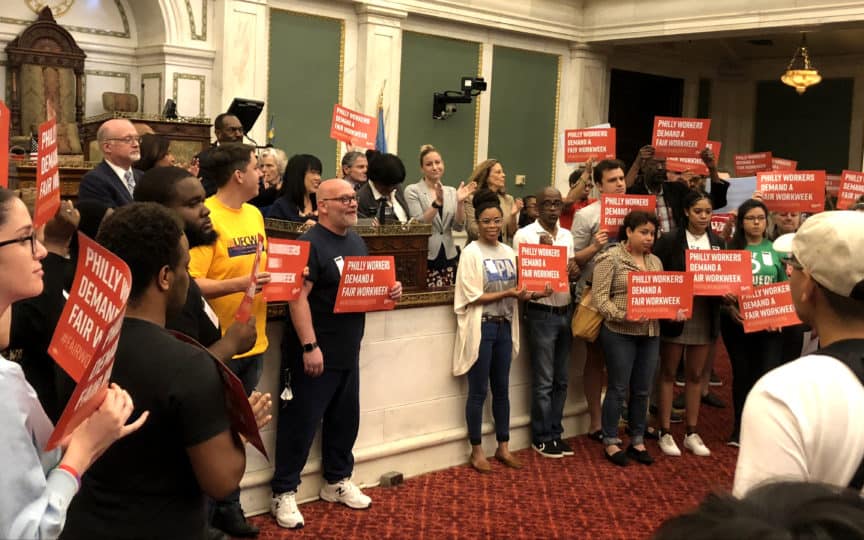PHILADELPHIA—Today City Councilmember Helen Gym (At Large) introduced legislation to bring Fair Workweek standards to Philadelphia. The bill brings Philadelphia in line with 15 other municipalities and states that have already passed commonsense laws to protect low-wage, hourly workers and their families. The bill has seven cosponsors in addition to Councilmember Gym: Councilmember Maria D. Quiñones-Sánchez (7th District), Councilmember Mark Squilla (1st District), Councilmember Bill Greenlee (At Large), Councilmember Bobby Henon (6th District), Councilmember Jannie Blackwell (3rd District), Councilmember Curtis Jones (4th District), Councilmember Kenyatta Johnson (2nd District).
The bill provides protections for 130,000 hourly workers earning the lowest wages at the nation’s largest corporations in the retail, foodservice and hospitality sectors. The bill includes provisions for advance notice of schedules, a pathway to access more hours of work, compensation for last-minute schedule changes, and protection from retaliation. This bill would only impact chains with at least 250 employees and 20 locations. Small and independent businesses are completely unaffected by the bill.
“This bill is one of the most significant efforts we as a city can do to improve the lives of working Philadelphians and support smart business practices,” said Councilmember Helen Gym (At Large). “In a city with such high poverty, we have to recognize that people aren’t poor by choice. Too many people are kept in poverty because of terrible practices like abusive scheduling that wreak havoc on people’s lives and leave them unable to predict their monthly incomes for rent or childcare. This isn’t just in the best interests of people—it’s smart business practice.”
In March, Councilmember Gym hosted a hearing on the impact of volatile work schedules and unstable hours on Philadelphia families and children. Those who testified emphasized the disproportionate impact of unstable schedules on women and families living in poverty, and called for legislation to guarantee Philadelphians a Fair Workweek. Since the hearing, Councilmember Gym launched an extensive engagement process that engaged more than 50 businesses and trade organizations and dozens of social service organizations.
A 2017 study of Philadelphia’s retail and restaurant sector showed that 79 percent of hourly workers do not have a regular work schedule and 45 percent cannot predict their monthly income because their schedules change so much. Meanwhile, a 2018 study of predictable scheduling at one of the nation’s largest retailers, The Gap, found that Fair Workweek practices increase worker productivity and company profitability.
“The companies we work for say that all the the employees in these stores are students. The truth is that most of us are parents raising our kids. We’re trying to provide for our kids. Some of us are veterans or are older people in their 70s trying to make ends meet. We’re not just students looking for extra cash; we’re trying to earn an income to support our families—including me,” said David Smith, One Pennsylvania member and Target employee.
“I am proud to work with my colleagues to move toward a Fair Workweek model and end reliance on scheduling practices that limit upward mobility for Philadelphia’s working families,” said Councilmember Maria D. Quiñones-Sánchez (7th District).
“This legislation is a major step to ensuring stability and economic security for the families of our city,” said Councilmember Mark Squilla (1st District). “I am proud to co-sponsor this bill and stand with the working people of Philadelphia to support commonsense workplace protections that are good for our hourly service workers and for our city.”
“I believe the key word is ‘fair.’ When workers are treated fairly that is not only good for the worker, but it’s good for the business,” said Councilmember Bill Greenlee (At Large). “When workers are respected they are more productive and the business succeeds.”
“This bill will ensure dignity and respect for the hardworking people of Philadelphia,” said Councilmember Bobby Henon (6th District). “Stable schedules are good for working people and this legislation will ensure that Philadelphia continues to be a great place to live, work, and do business.”
“Predictable schedules are key to building strong families and a strong city. When a parent cannot predict their work schedule, they cannot put their child in consistent child care, and these inconsistencies undermine a child’s cognitive and emotional development,” said Donna Cooper, Executive Director of Public Citizens for Children and Youth. “With predictable schedules some of these interruptions can be avoided, and I commend Councilmember Gym for introducing this legislation to protect Philadelphia families and children.”
Patrick J. Eiding, President of the Philadelphia Council of AFL-CIO said that in his long tenure in organized labor, he has observed working people forced to labor under declining conditions. “We believe strongly in the dignity of work and that all workers—and I want to emphasize that—all workers deserve to be treated fairly in their workplace,” Eiding said.
Fair Workweek PHL is a growing coalition of more than 35 organizations of working Philadelphians, community members, and labor partners coming together to restore dignity, respect, and reliability in Philadelphia workplaces through a Fair Workweek.
###
Contact: Melissa McCleery ([email protected])


